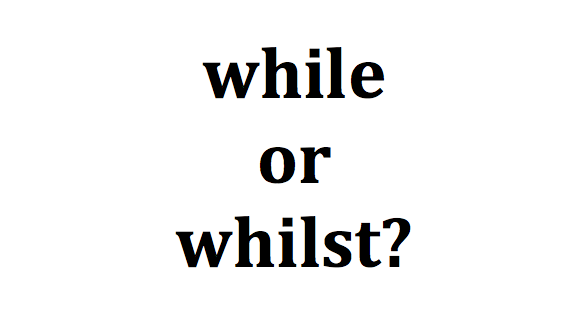On choosing to use ‘while’ or ‘whilst’, and why this question could be more important than you think.
The answer to the question of whether to use ‘while’ or ‘whilst’ is, in short, to use whichever you prefer and whichever you think will be most natural for the context and audience you are writing for. Basically, ‘while’ and ‘whilst’ are interchangeable in meaning, but usage varies according to preferences in different varieties of English. Some say ‘whilst’ is preferred in some varieties of English, while others say it sounds too old-fashioned. So in one sense, it’s up to you. But there is a little more to it than that.
When it comes to word choices like these, I recommend an approach that worries less about what is perceived to be ‘right’ or ‘wrong’ (because that is always going to vary) and focuses instead on pragmatic and logical reasoning. For me, you see, the question is not so much about whether to use ‘while’ or ‘whilst’ (although I choose to use ‘while’, which I explain further below), but whether to use ‘while’ or ‘although’. Let me explain.
First, let’s look at how we use while/whilst. You can see that we use it in two ways:
1. To mean ‘at the same time as’ or ‘during’. For example:
I’m enjoying a lovely cup of tea while/whilst I write this post.
2. To mean ‘although’ (or similar structures such as ‘in spite of’). For example:
While the food is great, you might have to wait a long time to be served.
You could change ‘while’ for ‘although’ in this second sentence and the meaning would still be the same. That is how you know you are using ‘while’ as a synonym for ‘although’. This wouldn’t work for the first sentence.
So basically, in the first sense – the sense of time – you can use either ‘while’ or ‘whilst’, depending on your preference. There is no difference in meaning, but rather different preferences for which ‘sounds’ best for a given audience. But in the second sense – the sense of contrast – you can see that we are using ‘while’ or ‘whilst’ as a synonym for ‘although’.
For the first sense, my preference is to use ‘while’. This is because I know that ‘whilst’ can come across as old-fashioned and potentially even pretentious to some readers. Let me stress that. I may or may not feel that way about the word ‘whilst’, but because I know some readers might, I choose not to use it. To me, there is no logical reason to risk potentially distracting or annoying a reader when ‘while’ is immediately intelligible. And I know that if you really want to write effectively, you need to put your readers first. So that is why my preference is to use ‘while’ and not ‘whilst’ when I mean ‘at the same time as’ or ‘during’.
Moving now to the second sense, it is probably now clear why I mentioned that the question for me is less about ‘while’ or ‘whilst’ and more about ‘while’ or ‘although’. After all, if ‘while’ can mean two different things (thus, by definition, being ambiguous), there is greater potential for my readers to misunderstand my message, even if only momentarily. And I don’t want to risk that. Look at this sentence:
While eating cake is great, we shouldn’t do it too often.
Because ‘while’ can mean both ‘although’ and ‘at the same time as’, readers might initially read my sentence as if I was going to say something like, ‘While eating cake, I drank tea’. They might immediately form a mental picture of me eating cake. It will not be until they read further into the sentence that they would realise that my meaning was actually ‘although’. They might even need to go back and read the sentence again. So because the potential to distract or confuse the reader is there, I choose to avoid ambiguous ‘while’ in such instances and use unambiguous ‘although’ instead.
Now granted, this is not too serious a misinterpretation, imagining me eating cake. But what if I was a technician reading a manual that told me, ‘While unscrewing the bolt…’ and I momentarily misunderstood and began unscrewing a bolt I wasn’t supposed to? But then I realise that the whole sentence actually read, ‘While unscrewing the bolt is recommended in most cases, it is very unsafe in this instance’. Granted again, this would not a great sentence for a manual, and the technician should have read the whole sentence, but technical manuals are not always written or read by people skilled or trained in recognising and avoiding such potential misreadings. Who knows what the consequence could be of that technician unscrewing that bolt?
I make the same choice with many other potentially ambiguous words for similar reasons. For example, I don't use ‘as’ or ‘since’ as synonyms for ‘because’ in sentences such as ‘As/Since I don’t know, I won’t…’. I just use ‘because’. (Yes, even when it starts a sentence.)
I do this not just to avoid ambiguity, but also to avoid mistranslation. If something has the potential to be translated into another language, it is imperative that the original text be as precise as possible. We should choose words with one single meaning whenever we can. There are two good reasons for this. First, we make the job of the translator easier. They won’t have to stop often to work out which of two or more potential meanings is intended. (As a bonus, this might also result in reduced translation costs.) Second, we help avoid the translator choosing the incorrect of two or more potential meanings of a word, the cost of which could be great.
I want my writing – and that of my clients – to be crystal clear. No ambiguities. And not just for reasons of style. When it comes to some technical and safety documentation in particular, people’s lives can actually be at stake. The financial and human costs of ambiguity in technical or safety documentation can be very great indeed.
In summary
When your meaning is ‘during’ or ‘at the same time as’, use ‘while’ or ‘whilst’ according to your or your readers’ preferences. When using ‘while’ or ‘whilst’ in the sense of ‘although’, however, I recommend that you just use ‘although’, thus avoiding ambiguity and its potentially very serious negative effects.




